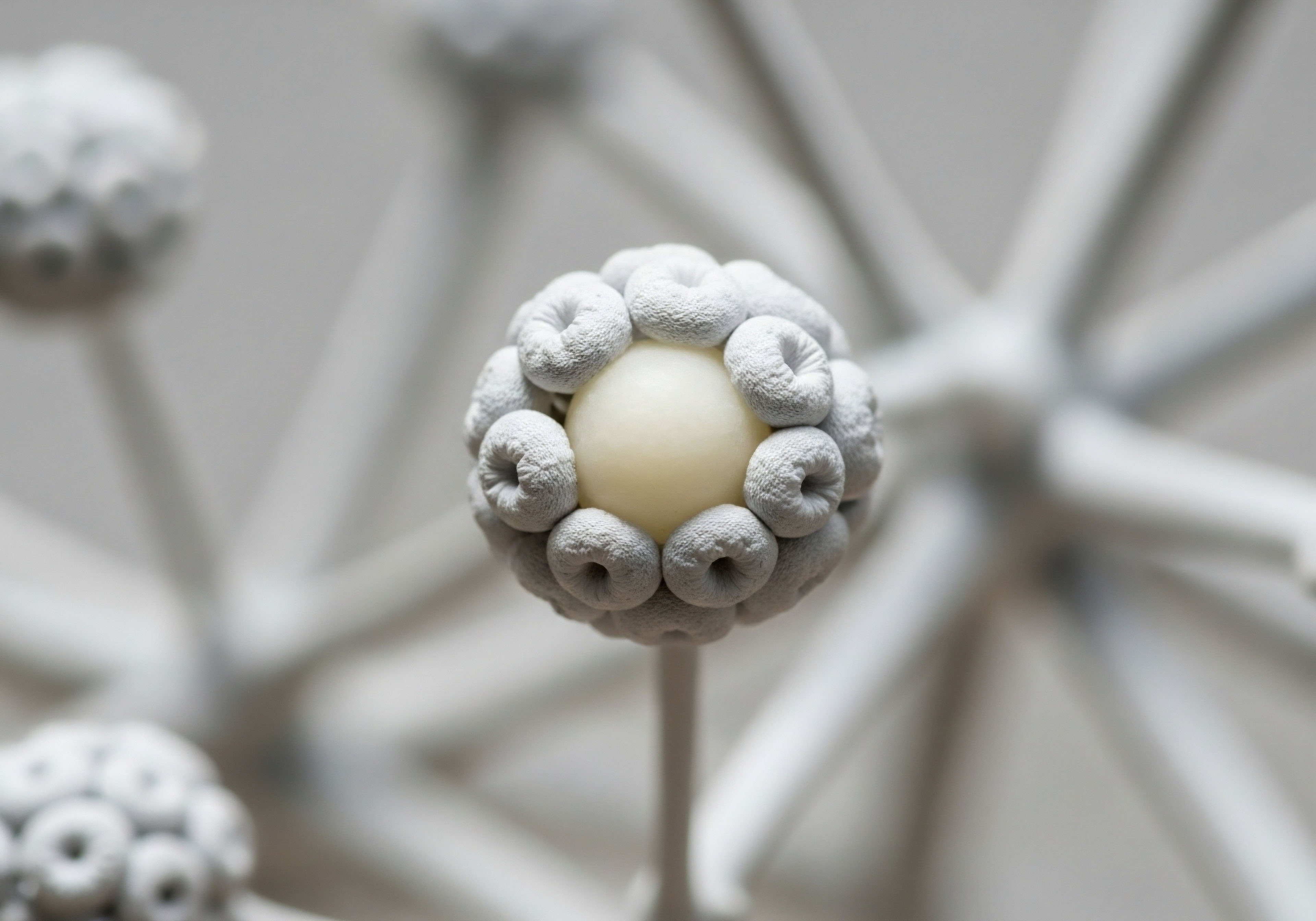

Fundamentals
The feeling can be subtle at first. A name that rests on the tip of your tongue, a misplaced set of keys, a momentary lapse in focus during a conversation. These experiences, often dismissed as normal parts of aging, can be deeply unsettling.
They represent a deviation from the seamless cognitive function you once took for granted. Your brain’s processing speed, its ability to recall information, and its capacity for sharp, clear thought are intimately tied to the complex and dynamic world of your endocrine system.
Understanding this connection is the first step toward addressing the root causes of these changes. The conversation about cognitive decline begins with an appreciation for the biological messengers, the hormones, that orchestrate so much of our physiological and mental reality.

The Brain’s Hormonal Environment
Your brain is a profoundly active endocrine organ, both producing its own hormones and responding with exquisite sensitivity to those circulating in your bloodstream. Hormones like testosterone, estrogen, and the signaling molecules that govern growth hormone release act as critical regulators of neuronal health.
They are the conductors of an intricate orchestra, ensuring that the symphony of thought, memory, and emotion plays in tune. When the levels of these key hormones decline, as they inevitably do with age, the music can falter. This is not a personal failing; it is a predictable physiological shift. The fog, the forgetfulness, the loss of mental sharpness ∞ these are often direct biological echoes of a changing internal environment.
Testosterone, for instance, has profound neuroprotective effects. It supports the structural integrity of neurons, promotes synaptic plasticity (the ability of brain cells to form new connections), and helps regulate neurotransmitters that are vital for mood and focus. Similarly, estrogen plays a crucial role in brain energy metabolism, inflammation control, and the health of the hippocampus, the brain’s primary memory center.
The decline of these hormones during andropause in men and menopause in women removes a layer of this essential biochemical support, leaving the brain more vulnerable to age-related stress and cellular damage.
The subtle decline in cognitive sharpness with age is frequently a direct reflection of shifts within the body’s hormonal landscape.

From Symptoms to Systems
It is validating to understand that what you are experiencing has a biological basis. The frustration of cognitive lapse is real, and it originates in the complex interplay of your body’s systems. The Hypothalamic-Pituitary-Gonadal (HPG) axis, the command center for sex hormone production, is a perfect example.
This elegant feedback loop ensures that your body produces the right amount of testosterone or estrogen. With age, the signals from the brain’s pituitary gland can weaken, or the gonads (testes and ovaries) may become less responsive. The result is a systemic decline in the hormones your brain has relied upon for decades to function optimally.
Likewise, the production of growth hormone (GH), which is vital for cellular repair and regeneration throughout the body, also diminishes with age. This decline is governed by a similar feedback system involving Growth Hormone-Releasing Hormone (GHRH). Peptides like Sermorelin and Ipamorelin are designed to stimulate this system, encouraging your body to produce its own growth hormone.
This approach seeks to restore a more youthful physiological environment, one where the brain has the resources it needs to repair damage, maintain cellular energy, and support robust cognitive function. By viewing these symptoms through the lens of systems biology, we can begin to see a path toward proactive, personalized intervention.


Intermediate
Understanding that hormonal shifts impact cognitive function is the foundational step. The next is to explore the specific clinical strategies designed to address these changes. Personalized hormone optimization is a methodical process of biochemical recalibration. It involves assessing an individual’s unique hormonal signature through detailed lab work and then creating a protocol to restore balance.
This is a targeted intervention, moving from the general concept of hormonal decline to the precise application of therapeutic agents like testosterone, progesterone, and specialized peptides. The goal is to re-establish the physiological conditions that support optimal brain health and cognitive performance.

Protocols for Endocrine System Support
The clinical protocols for hormone optimization are tailored to the distinct physiological needs of men and women, acknowledging the different ways in which hormonal decline manifests. These are not one-size-fits-all solutions; they are carefully calibrated interventions based on symptoms and serum levels.

Male Hormone Optimization
For middle-aged and older men experiencing symptoms of low testosterone (andropause), such as cognitive fog, low motivation, and memory issues, Testosterone Replacement Therapy (TRT) is a primary intervention. The protocol is designed to restore testosterone to a healthy, youthful range while managing potential side effects.
- Testosterone Cypionate ∞ This is the foundational element, typically administered via weekly intramuscular injections. It provides a steady, bioidentical source of the primary male androgen.
- Gonadorelin ∞ Administered as a subcutaneous injection, Gonadorelin is a peptide that mimics the body’s natural Gonadotropin-Releasing Hormone (GnRH). Its inclusion is critical for maintaining the function of the HPG axis, preventing testicular atrophy, and preserving natural testosterone production.
- Anastrozole ∞ This oral medication is an aromatase inhibitor. It blocks the conversion of testosterone into estrogen, which can occur at higher rates during TRT. Controlling estrogen levels is key to mitigating side effects like water retention and mood changes.
- Enclomiphene ∞ This selective estrogen receptor modulator (SERM) may be included to support the pituitary’s output of Luteinizing Hormone (LH) and Follicle-Stimulating Hormone (FSH), further supporting the body’s endogenous hormonal machinery.

Female Hormone Balance
For women in perimenopause and post-menopause, hormonal therapy addresses the decline in estrogen, progesterone, and often testosterone. The goal is to alleviate symptoms like hot flashes, mood swings, and cognitive disturbances while providing neuroprotection.
- Testosterone Cypionate ∞ Women also benefit from testosterone for libido, energy, and cognitive clarity. The dosage is significantly lower than for men, typically administered via subcutaneous injection. Low-dose testosterone can be particularly effective in restoring mental sharpness.
- Progesterone ∞ This hormone is prescribed based on menopausal status. For women with a uterus, progesterone is essential to protect the uterine lining when taking estrogen. It also has its own beneficial effects on sleep and mood.
- Pellet Therapy ∞ This method involves implanting small, long-acting pellets of testosterone (and sometimes estradiol) under the skin. It provides a steady release of hormones over several months, offering a convenient alternative to injections.

Growth Hormone Peptide Therapy
Peptide therapies represent a more nuanced approach to hormonal optimization. Instead of directly replacing a hormone, these protocols use specific peptides to stimulate the body’s own production of growth hormone from the pituitary gland. This approach is often favored by active adults seeking improvements in recovery, body composition, sleep quality, and cognitive function.
Personalized protocols work by restoring the specific hormonal signals the brain requires for memory, focus, and overall neuronal health.
| Peptide | Primary Mechanism | Common Application |
|---|---|---|
| Sermorelin | Mimics GHRH to stimulate natural GH pulses. | General anti-aging, sleep improvement, and cognitive support. |
| Ipamorelin / CJC-1295 | A potent combination that provides a strong, sustained release of GH with minimal side effects. | Muscle gain, fat loss, and enhanced recovery. |
| Tesamorelin | A highly effective GHRH analogue specifically studied for its ability to reduce visceral fat. | Targeted fat loss and metabolic health improvement. |
| MK-677 (Ibutamoren) | An oral ghrelin mimetic that stimulates GH and IGF-1. | Convenient oral administration for muscle mass and sleep quality. |
These peptides work by interacting with specific receptors in the brain, signaling the pituitary to release a pulse of growth hormone. This mimics the body’s natural rhythms, providing the benefits of increased GH and its downstream effector, Insulin-like Growth Factor 1 (IGF-1), without suppressing the natural feedback loop. The resulting improvements in cellular repair, sleep architecture, and reduced inflammation can have a direct and positive impact on cognitive vitality.


Academic
A sophisticated analysis of hormonal optimization and its influence on cognitive decline requires moving beyond symptom management to the underlying neurobiology. The central thesis is that personalized endocrine therapies can mitigate age-related cognitive decline by restoring the neuroprotective, neurotrophic, and metabolic support that is lost with the involution of the gonadal and somatotropic axes.
This perspective is grounded in the understanding that the brain is a primary target organ for sex steroids and growth factors, which collectively modulate synaptic plasticity, neurotransmission, and cellular resilience. The efficacy of these interventions, however, is deeply dependent on timing, dosage, and the specific molecular pathways being targeted.

The Neurobiology of Sex Steroids and Cognition
Testosterone and estradiol are potent neuromodulators whose actions are mediated by a network of nuclear and membrane-bound receptors throughout the brain. Their decline is linked to an increased risk of dementia and Alzheimer’s disease. Observational studies have consistently shown an association between lower endogenous testosterone levels in aging men and poorer performance on tests of verbal memory, visuospatial ability, and executive function.
Mechanistically, androgens exert neuroprotective effects by upregulating anti-apoptotic proteins, reducing oxidative stress, and promoting the expression of Brain-Derived Neurotrophic Factor (BDNF), a key molecule for neuronal survival and synaptogenesis.
In women, the story is intricately linked to estrogen. The “critical window” or “timing hypothesis” is a dominant paradigm in the discussion of estrogen replacement and cognitive health. This hypothesis posits that initiating estrogen therapy close to the onset of menopause may confer significant neuroprotective benefits, including a reduced risk of Alzheimer’s disease.
Estrogen is known to enhance cerebral glucose metabolism, increase cholinergic activity, and reduce the formation of amyloid-beta plaques, a key pathological hallmark of Alzheimer’s. However, initiating therapy many years after menopause, as demonstrated in the Women’s Health Initiative Memory Study (WHIMS), may fail to produce these benefits and could even be detrimental, suggesting that the brain’s hormonal milieu undergoes irreversible changes if left unsupported for too long.

What Are the Risks of Hormone Therapy Initiated Late in Life?
The timing of intervention appears to be a critical determinant of its risk-benefit profile. Research, particularly the Women’s Health Initiative Memory Study, has indicated that initiating hormone therapy in women aged 65 or older may be associated with an increased risk of cognitive impairment and brain atrophy.
A large observational study in Finland noted an increased risk for Alzheimer’s disease in women who initiated hormone therapy after the age of 60, particularly with long-term use. This suggests that once a certain window of opportunity closes, the brain’s cellular machinery may no longer be receptive to the protective effects of hormones, and introducing them may even disrupt a newly established homeostatic balance.
For men, while the evidence is less definitive, some large clinical trials have not shown a cognitive benefit from testosterone treatment, particularly when initiated in older men without baseline cognitive impairment, highlighting the complexity of these interventions.
The efficacy of hormonal therapies for cognitive protection is critically dependent on the timing of initiation relative to the onset of menopause or andropause.

Growth Hormone Axis and Neurotransmitter Function
The age-related decline in the growth hormone/IGF-1 axis, known as somatopause, also contributes to cognitive changes. Both GH and IGF-1 have receptors in key cognitive centers like the hippocampus and prefrontal cortex. Peptide therapies using GHRH analogues like Sermorelin or Tesamorelin offer a more physiological approach to restoring this axis compared to direct GH administration. A key mechanism through which these peptides may enhance cognition is the modulation of neurotransmitter systems.
A 20-week randomized clinical trial administering GHRH to adults with Mild Cognitive Impairment (MCI) and healthy older adults provided compelling evidence for this. Using proton magnetic resonance spectroscopy, researchers observed significant treatment-related increases in brain levels of the primary inhibitory neurotransmitter, gamma-aminobutyric acid (GABA), in the frontal cortex, posterior cingulate, and temporal lobe.
Elevated GABAergic tone is associated with reduced neuronal hyperexcitability, which is often seen in aging and early Alzheimer’s pathology. The study also found a decrease in myo-inositol, a marker of glial cell activity and inflammation. These findings suggest that GHRH-based therapies may improve the brain’s signaling environment, shifting it from a state of pro-inflammatory hyperexcitability to one of regulated inhibition and reduced inflammation, thereby creating conditions more conducive to healthy cognitive function.
| Hormone/Factor | Primary Neurological Influence | Cognitive Domain Affected |
|---|---|---|
| Testosterone | Supports synaptic plasticity, reduces amyloid-beta toxicity. | Visuospatial skills, Executive Function, Memory. |
| Estrogen | Enhances cerebral glucose metabolism, cholinergic function. | Verbal Memory, Global Cognition. |
| IGF-1 (via GHRH) | Promotes neurogenesis, modulates GABAergic neurotransmission. | Executive Function, Processing Speed. |

References
- Zarrouf, Faith A. et al. “Testosterone and Cognitive Function in Aging ∞ A Systematic Review.” Cognitive and Behavioral Neurology, vol. 22, no. 3, 2009, pp. 157-166.
- Yeung, Andy. “Testosterone, cognitive decline and dementia in ageing men.” Endocrinology, Diabetes & Metabolism, vol. 3, no. 4, 2020, e00155.
- Savolainen-Peltonen, Hanna, et al. “Hormone Replacement Therapy and Alzheimer’s Disease ∞ Current State of Knowledge and Implications for Clinical Use.” Journal of Prevention of Alzheimer’s Disease, vol. 10, no. 3, 2023, pp. 432-441.
- Lv, W. et al. “An Updated Review ∞ Androgens and Cognitive Impairment in Older Men.” Frontiers in Endocrinology, vol. 11, 2020, p. 597975.
- Vellas, B. et al. “Growth Hormone ∞ Releasing Hormone Effects on Brain γ-Aminobutyric Acid Levels in Mild Cognitive Impairment and Healthy Aging.” JAMA Neurology, vol. 72, no. 8, 2015, pp. 916-924.
- Nerattini, Matilde, et al. “Estrogen-based menopause hormone therapy and Alzheimer’s disease risk ∞ a systematic review and meta-analysis.” Frontiers in Aging Neuroscience, vol. 15, 2023.
- Cherrier, M. M. et al. “Testosterone treatment of men with mild cognitive impairment and low testosterone.” American Journal of Alzheimer’s Disease & Other Dementias, vol. 30, no. 4, 2015, pp. 421-430.
- “Growth Hormone Peptides (GhRP) ∞ A Proven Anti-Aging Solution Gaining Popularity.” Performance Rejuvenation Center, 2024.
- “Peptides for Brain Function ∞ Boost Cognitive Performance and Mental Clarity.” Healthnews, 2023.
- “Does Hormone Replacement Therapy Increase Alzheimer’s Risk? | Cognitive Vitality.” Alzheimer’s Drug Discovery Foundation, 2019.

Reflection

Charting Your Own Biological Course
The information presented here illuminates the profound connection between your internal biochemistry and your cognitive world. It validates the lived experience of mental fog and memory lapses, attributing them to tangible, measurable physiological shifts. This knowledge is powerful. It transforms the narrative from one of passive acceptance of age-related decline to one of proactive, informed engagement with your own health.
The journey to cognitive vitality is deeply personal, and it begins with understanding the unique landscape of your own endocrine system. The path forward involves a partnership with clinical science, using data as a map to navigate the complexities of your biology. What you have learned is not an endpoint, but a starting point for a new conversation about what is possible for your health and longevity.



